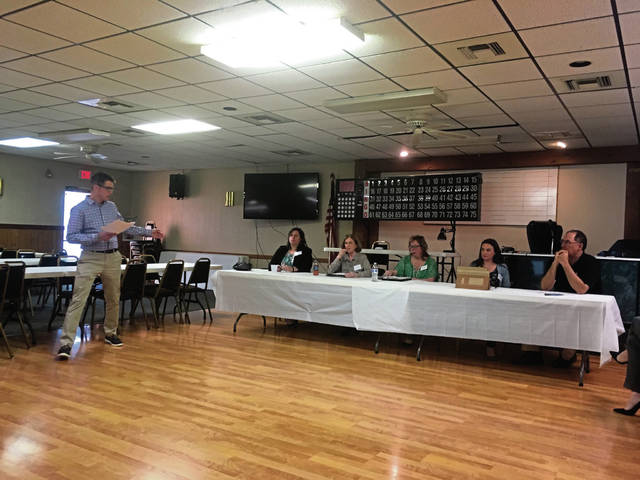https://triblive.com/local/valley-news-dispatch/highlands-school-board-candidates-outline-priorities-at-harrison-forum/
Highlands school board candidates outline priorities at Harrison forum

More transparency, more fiscal responsibility and a focus on teaching basic life skills to complement a strong curriculum were among the ideas expressed by Highlands School Board candidates at a forum in Harrison.
“I’ve gone to many, many meetings and watched the deterioration and frustration of the community,” said Region III candidate Kristie Babinsack. “You can either be part of the frustration or part of the solution. Taxpayers, as we all are, are seeing the increases in the taxes but don’t know what’s happening with our money. That affects all of us. … Special-needs kids are not having their needs met. These are all things that are priorities in our community.”
District residents had an opportunity to hear from current and potential school board members Monday night at a special nonpartisan public forum hosted by the Harrison Township Democratic Committee. About 30 to 40 people showed up.
Babinsack was joined on the panel at the Natrona Heights Veterans of Foreign Wars post by newcomers Kelli Canonge of Region II, Laura Butler of Region III, Gene Witt of Region I and board Vice President Michelle Peters of Region III. Incumbent Judy Wisner of Region I did not attend because of scheduling conflicts.
Committee member Clint Crowell served as the emcee, and committee member Erin McClelland asked the forum questions. Questions ranged from what are you looking for in a superintendent to how would you improve the district’s academic standing and student safety. They were asked for their stances on cyber and charter schools.
Butler said the district needs to work more with the community, particularly about what goes on in schools and how taxpayer money is used.
“You can’t work in silos,” she said. “There’s a lot of good resources in this community. I really think that we need to work together. There’s other things that we could be doing, even working with (township) commissioners. … I think it’s really important to share and have transparency, getting folks involved. … Nobody’s looking at human resources, finances.”
Babinsack encouraged bringing back home economics classes, driver’s education, cursive writing and related courses.
“Those are things that our kids need, real-life skills,” she said. “Our teachers are teaching to the PSSAs. They are teaching to the test. That test doesn’t prove our kids are smart. What proves our kids are smart is if they can do basic life skills and can go out into the world and live.”
Canonge said life skills are important, but so is testing to determine where students may be struggling and how to improve.
“What we have the capacity of doing better is providing a needs assessment to the community that integrates those concepts so that we have a better idea of what needs to be taught,” Canonge said. “Not making assumptions based on what we hear from one person. … I agree sometimes we teach to tests, and that is a problem and very frustrating for students. That’s the only information that they can use to compare and contrast us against one another.”
Candidates talked about how cyber and charter schools have become a financial burden to public schools and how families who make that choice for their children should pay tuition instead of having school districts pay.
Witt said the district does not have a strategic plan and talked about how he sent one of his daughters to a cyber/charter school because she was diagnosed with Asperger’s syndrome and Highlands was not prepared to help her.
“I think the question is not should we force everybody to come to our school, but why don’t people want to come to our school,” he said. “We have the advantage. We’re here. What are we not doing that’s causing people to want to go somewhere else?”
Candidates said they would like to see their superintendent show leadership, a devotion to education and a good handle on finances.
Monique Mawhinney was appointed superintendent last month after having served as substitute superintendent since July.
The district has a projected $3.7 million shortfall in its preliminary 2019-20 budget with projected spending of about $46 million and revenues at $42.3 million.
It seeks exceptions from the state Department of Education to possibly raise property taxes by more than its 3.3 percent limit.
Peters said it’s important to recognize the good things in the district as well as overcome its challenges. She said the superintendent has a strategic plan that is posted on the district’s website.
“There’s still a lot of good things in Highlands,” she said. “Even with all this transition and all these new things that went on, they did a fantastic job and need recognized. … We can work on that, saying thank you for the things that are working (and) not just focusing on those that aren’t.”
Copyright ©2025— Trib Total Media, LLC (TribLIVE.com)
